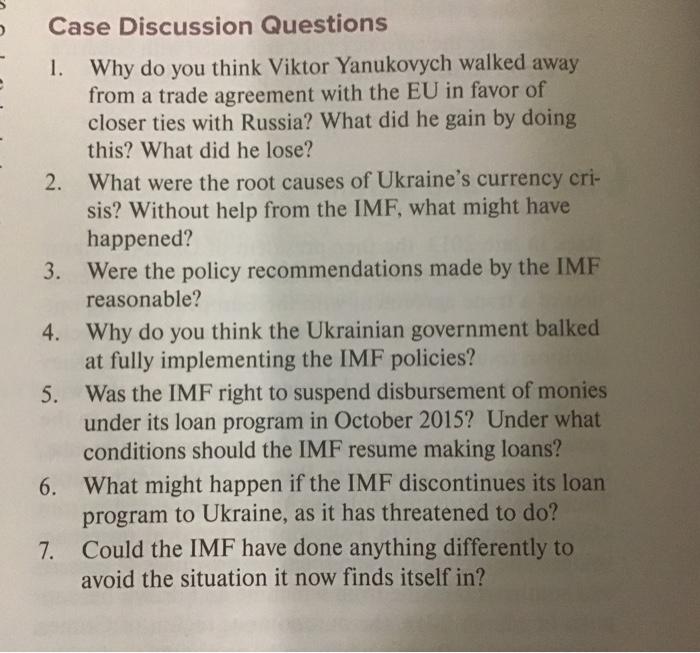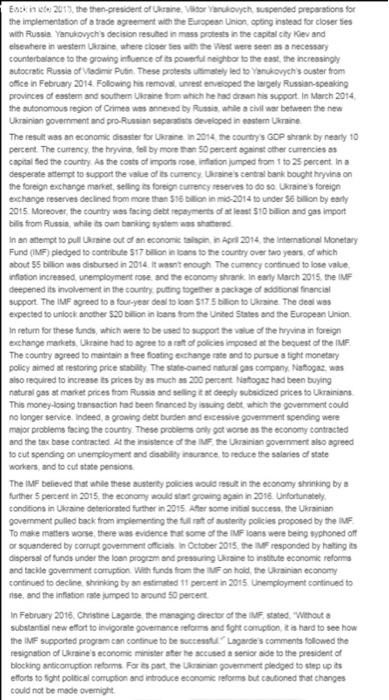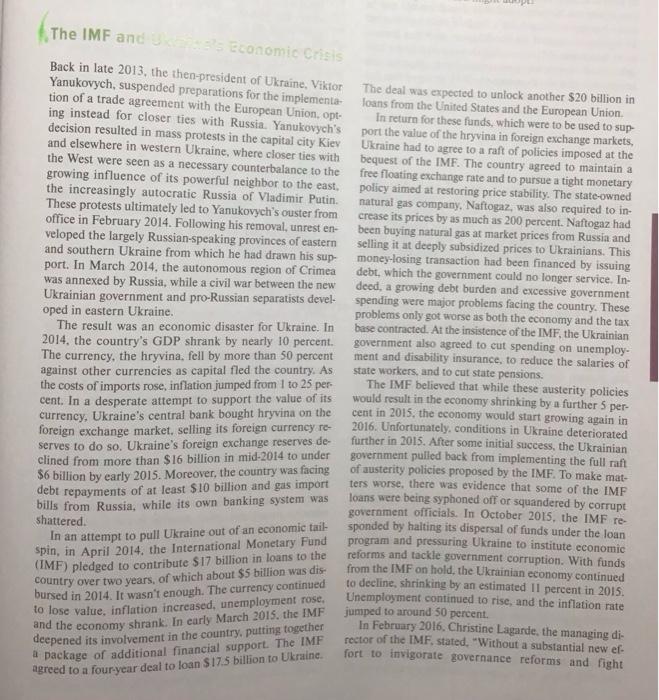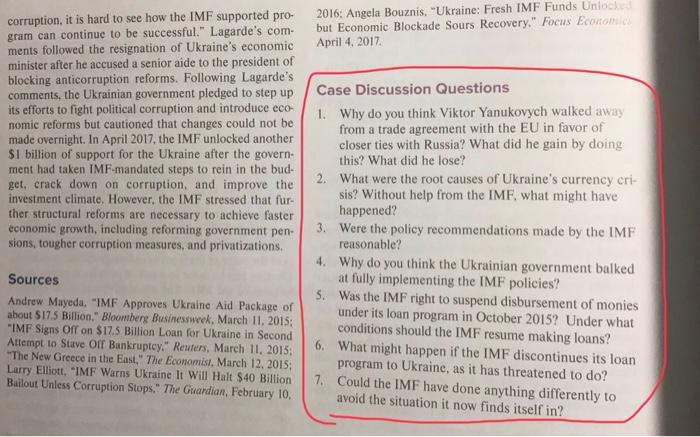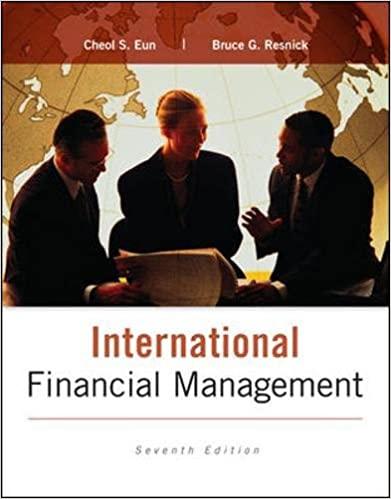Case Discussion Questions 1. Why do you think Viktor Yanukovych walked away from a trade agreement with the EU in favor of closer ties with Russia? What did he gain by doing this? What did he lose? 2. What were the root causes of Ukraine's currency cri- sis? Without help from the IMF, what might have happened? 3. Were the policy recommendations made by the IMF reasonable? 4. Why do you think the Ukrainian government balked at fully implementing the IMF policies? 5. Was the IMF right to suspend disbursement of monies under its loan program in October 2015? Under what conditions should the IMF resume making loans? 6. What might happen if the IMF discontinues its loan program to Ukraine, as it has threatened to do? 7. Could the IMF have done anything differently to avoid the situation it now finds itself in? Ein 2015. the then president of Ukraine, Voronovych suspended preparations for the implementation of a trade agreement with the European Union opting instead for closer ses with Russia Yanukovych s decision resulted in a protests in the capital city Kevand elsewhere in western Ukraine where closer tes the West were seen as a necessary counterbalance to the growing infuence of its powerful neighbor to the east, the increasingly autocratic Russia of Vadimir Putin. These protests styled to Youkovych souster from office in February 2014. Following his removal restoped the largely Russian-speaking provinces of eastern and southern Ukrainetromatich he had an is support. In March 2014 the autonomous region of Crimes we need by Rutile a civil war between the new Ukrainian government and pro-Russian separats developed in eastern Ukraine The result was an economic disaster for Urnen 2014 the country's GOP shrink by nearly 10 percent. The currency the hyvina foil by more than 50 percent against other currencies capital fled the country. As the cost of imports rotation jumped from 1 to 25 percentina desperate attempt to support the value of its currency Ukraine's central bank bought hyvinson the foreign exchange market selling is foreign currency reserves to do so Ukraine's foreign exchange reserves declined from more than 516 bilion in mic 2014 to under 6ton by early 2015 Moreover, the country was facing debt repayments of at least 10 billion and gas import bilis from Russia, while its own banking systems had In an attempt to pull raine out of an economics in April 2014 the International Monetary Fund (IMF) pledged to contribute 517 billion in ons to the country over two years of which about 55 billion was disbursed in 2014 it wasn't enough The currency continued to lose valve inflation increased unemployment rose and the economy shrank in March 2015 the IMF deepened its involvement in the country putting together a package of additional financial support. The IMF agreed to a four-year deal to $175 billion to Ursine. The deal was expected to unlock another 520 billion in ons from the United States and the European Union. In return for these funds, which were to be used to support the value of the hyvina in foreign exchange markets Ukraine had to agree to tal policies imposed at the bequest of the IME The country agreed to maintains tree floating exchange rate and to pursue a tight monetary policy nimed at restoring price stability The state-owned natural gas company Natogas, was is required to increase its prices by as much as 200 percent. Matogee had been buying natural gas at market prices from Russia and selling tot deeply subsidized prices to Ukrainians This moneylosing transaction had been frated by issuing debt which the government could no longer service. Indeed a growing det burden and excessive government spending were major problems facing the country. These problems only got worse as the economy contracted and the tabase contracted. At the insistence of the MF the Ukrainian government also agreed to cut spending on unemployment and disability insurance to reduce the salaries of state workers and to cut state pensions The IMF believed that while these austerity policies wode result in the economy shining by further 5 percent in 2015, the economy would start growing again in 2016. Unfortunately conditions in Ukraine deteriorated further in 2015. Ater som til sucess, the Ukrainian government pulled back from implementing the full ret of susterity policies proposed by the IMF To make matters worse, there was evidence that some of the IMF loans were being typhoned off or squandered by corrupt government officials in October 2015 the IMF responded by hating its dispersal of funds under the foon program and pressuring Ukraine to institute economic reforms and tacide government coruption with funds from the MF on hold the Ukrainian economy continued to decine, shrinkag by an estimated 51 percent in 2015. Unemployment continued to nise, and the inflation rate jumped to around 50 percent In February 2016, Christine Lagarde, the managing director of the IMF stated. Without a substantial new effort to invigorate governance reforms and fight corruption is hard to see how the IMF supported program can continue to be set Lagades comments followed the resignation of Ukraine's economic ministerster he sccuted a senior side to the president of blocking anticoruption reforms For as part the government pledged to step up is efforts to light political corruption and introduce economic reforms but cautioned that changes could not be made overnight The IMF and Economic crisis Back in late 2013, the then president of Ukraine, Viktor Yanukovych, suspended preparations for the implementa- The deal was expected to unlock another $20 billion in tion of a trade agreement with the European Union, opt- loans from the United States and the European Union. ing instead for closer ties with Russia. Yanukovych's In return for these funds, which were to be used to sup decision resulted in mass protests in the capital city Kiey Ukraine had to agree to a raft of policies imposed at the port the value of the hryvina in foreign exchange markets, and elsewhere in western Ukraine, where closer ties with the West were seen as a necessary counterbalance to the bequest of the IMF. The country agreed to maintain a free floating exchange rate and to pursue a tight monetary growing influence of its powerful neighbor to the cast, policy aimed at restoring price stability. The state-owned the increasingly autocratie Russia of Vladimir Putin. natural gas company, Naftogaz, was also required to in- These protests ultimately led to Yanukovych's ouster from crease its prices by as much as 200 percent. Naftogaz had office in February 2014. Following his removal, unrest en been buying natural gas at market prices from Russia and veloped the largely Russian-speaking provinces of eastern selling it at deeply subsidized prices to Ukrainians. This and southern Ukraine from which he had drawn his sup money-losing transaction had been financed by issuing port. In March 2014, the autonomous region of Crimea debt, which the government could no longer service. In- was annexed by Russia, while a civil war between the new deed, a growing debt burden and excessive government Ukrainian government and pro-Russian separatists devel spending were major problems facing the country. These oped in eastern Ukraine. problems only got worse as both the economy and the tax The result was an economic disaster for Ukraine. In base contracted. At the insistence of the IMF, the Ukrainian 2014, the country's GDP shrank by nearly 10 percent. government also agreed to cut spending on unemploy- The currency, the hryvina, fell by more than 50 percent ment and disability insurance, to reduce the salaries of state workers, and to cut state pensions. against other currencies as capital fled the country. As The IMF believed that while these austerity policies the costs of imports rose, inflation jumped from 1 to 25 per would result in the economy shrinking by a further 5 per cent. In a desperate attempt to support the value of its cent in 2015, the economy would start growing again in currency, Ukraine's central bank bought hryvina on the 2016. Unfortunately, conditions in Ukraine deteriorated foreign exchange market, selling its foreign currency re- further in 2015. After some initial success, the Ukrainian serves to do so. Ukraine's foreign exchange reserves de government pulled back from implementing the full raft clined from more than $16 billion in mid-2014 to under of austerity policies proposed by the IMF. To make mat- $6 billion by early 2015. Moreover, the country was facing ters worse, there was evidence that some of the IMF loans were being syphoned off or squandered by corrupt government officials. In October 2015, the IMF re- shattered. sponded by halting its dispersal of funds under the loan program and pressuring Ukraine to institute economic reforms and tackle government corruption. With funds from the IMF on hold, the Ukrainian economy continued to decline, shrinking by an estimated Il percent in 2015, Unemployment continued to rise, and the inflation rate jumped to around 50 percent. In February 2016. Christine Lagarde, the managing di- rector of the IMF, stated, "Without a substantial new ef- fort to invigorate governance reforms and fight debt repayments of at least $10 billion and gas import bills from Russia, while its own banking system was In an attempt to pull Ukraine out of an economic tail- spin, in April 2014. the International Monetary Fund (IMF) pledged to contribute $17 billion in loans to the country over two years, of which about $5 billion was dis- bursed in 2014. It wasn't enough. The currency continued to lose value, inflation increased, unemployment rose, and the economy shrank. In early March 2015, the IMF deepened its involvement in the country, putting together package of additional financial support. The IMF agreed to a four-year deal to loan $17.5 billion to Ukraine. 2016: Angela Bouznis. "Ukraine: Fresh IMF Funds Unlocked but Economic Blockade Sours Recovery." Focus Economic April 4, 2017 corruption, it is hard to see how the IMF supported pro- gram can continue to be successful." Lagarde's com- ments followed the resignation of Ukraine's economic minister after he accused a senior aide to the president of blocking anticorruption reforms. Following Lagarde's comments, the Ukrainian government pledged to step up its efforts to fight political corruption and introduce eco- nomic reforms but cautioned that changes could not be made overnight. In April 2017, the IMF unlocked another $1 billion of support for the Ukraine after the govern. ment had taken IMF-mandated steps to rein in the bud- get crack down on corruption, and improve the investment climate. However, the IMF stressed that fur- ther structural reforms are necessary to achieve faster economic growth, including reforming government pen- sions, tougher corruption measures, and privatizations, Case Discussion Questions 1. Why do you think Viktor Yanukovych walked away from a trade agreement with the EU in favor of closer ties with Russia? What did he gain by doing this? What did he lose? 2. What were the root causes of Ukraine's currency cri- sis? Without help from the IMF, what might have happened? 3. Were the policy recommendations made by the IMF reasonable? 4. Why do you think the Ukrainian government balked at fully implementing the IMF policies? 5. Was the IMF right to suspend disbursement of monies under its loan program in October 2015? Under what conditions should the IMF resume making loans? 6. What might happen if the IMF discontinues its loan program to Ukraine, as it has threatened to do? 7. Could the IMF have done anything differently to avoid the situation it now finds itself in? Sources Andrew Mayeda. "IMF Approves Ukraine Aid Package of about $17.5 Billion." Bloomberg Businessweek, March 11, 2015: "IMF Signs Off on $17.5 Billion Loan for Ukraine in Second Attempt to Stave Off Bankruptcy." Reuters, March 11. 2015: "The New Greece in the East, The Economist, March 12, 2015; Larry Elliott, "IMF Warns Ukraine It Will Halt $40 Billion Bailout Unless Corruption Stops." The Guardian, February 10, Case Discussion Questions 1. Why do you think Viktor Yanukovych walked away from a trade agreement with the EU in favor of closer ties with Russia? What did he gain by doing this? What did he lose? 2. What were the root causes of Ukraine's currency cri- sis? Without help from the IMF, what might have happened? 3. Were the policy recommendations made by the IMF reasonable? 4. Why do you think the Ukrainian government balked at fully implementing the IMF policies? 5. Was the IMF right to suspend disbursement of monies under its loan program in October 2015? Under what conditions should the IMF resume making loans? 6. What might happen if the IMF discontinues its loan program to Ukraine, as it has threatened to do? 7. Could the IMF have done anything differently to avoid the situation it now finds itself in? Ein 2015. the then president of Ukraine, Voronovych suspended preparations for the implementation of a trade agreement with the European Union opting instead for closer ses with Russia Yanukovych s decision resulted in a protests in the capital city Kevand elsewhere in western Ukraine where closer tes the West were seen as a necessary counterbalance to the growing infuence of its powerful neighbor to the east, the increasingly autocratic Russia of Vadimir Putin. These protests styled to Youkovych souster from office in February 2014. Following his removal restoped the largely Russian-speaking provinces of eastern and southern Ukrainetromatich he had an is support. In March 2014 the autonomous region of Crimes we need by Rutile a civil war between the new Ukrainian government and pro-Russian separats developed in eastern Ukraine The result was an economic disaster for Urnen 2014 the country's GOP shrink by nearly 10 percent. The currency the hyvina foil by more than 50 percent against other currencies capital fled the country. As the cost of imports rotation jumped from 1 to 25 percentina desperate attempt to support the value of its currency Ukraine's central bank bought hyvinson the foreign exchange market selling is foreign currency reserves to do so Ukraine's foreign exchange reserves declined from more than 516 bilion in mic 2014 to under 6ton by early 2015 Moreover, the country was facing debt repayments of at least 10 billion and gas import bilis from Russia, while its own banking systems had In an attempt to pull raine out of an economics in April 2014 the International Monetary Fund (IMF) pledged to contribute 517 billion in ons to the country over two years of which about 55 billion was disbursed in 2014 it wasn't enough The currency continued to lose valve inflation increased unemployment rose and the economy shrank in March 2015 the IMF deepened its involvement in the country putting together a package of additional financial support. The IMF agreed to a four-year deal to $175 billion to Ursine. The deal was expected to unlock another 520 billion in ons from the United States and the European Union. In return for these funds, which were to be used to support the value of the hyvina in foreign exchange markets Ukraine had to agree to tal policies imposed at the bequest of the IME The country agreed to maintains tree floating exchange rate and to pursue a tight monetary policy nimed at restoring price stability The state-owned natural gas company Natogas, was is required to increase its prices by as much as 200 percent. Matogee had been buying natural gas at market prices from Russia and selling tot deeply subsidized prices to Ukrainians This moneylosing transaction had been frated by issuing debt which the government could no longer service. Indeed a growing det burden and excessive government spending were major problems facing the country. These problems only got worse as the economy contracted and the tabase contracted. At the insistence of the MF the Ukrainian government also agreed to cut spending on unemployment and disability insurance to reduce the salaries of state workers and to cut state pensions The IMF believed that while these austerity policies wode result in the economy shining by further 5 percent in 2015, the economy would start growing again in 2016. Unfortunately conditions in Ukraine deteriorated further in 2015. Ater som til sucess, the Ukrainian government pulled back from implementing the full ret of susterity policies proposed by the IMF To make matters worse, there was evidence that some of the IMF loans were being typhoned off or squandered by corrupt government officials in October 2015 the IMF responded by hating its dispersal of funds under the foon program and pressuring Ukraine to institute economic reforms and tacide government coruption with funds from the MF on hold the Ukrainian economy continued to decine, shrinkag by an estimated 51 percent in 2015. Unemployment continued to nise, and the inflation rate jumped to around 50 percent In February 2016, Christine Lagarde, the managing director of the IMF stated. Without a substantial new effort to invigorate governance reforms and fight corruption is hard to see how the IMF supported program can continue to be set Lagades comments followed the resignation of Ukraine's economic ministerster he sccuted a senior side to the president of blocking anticoruption reforms For as part the government pledged to step up is efforts to light political corruption and introduce economic reforms but cautioned that changes could not be made overnight The IMF and Economic crisis Back in late 2013, the then president of Ukraine, Viktor Yanukovych, suspended preparations for the implementa- The deal was expected to unlock another $20 billion in tion of a trade agreement with the European Union, opt- loans from the United States and the European Union. ing instead for closer ties with Russia. Yanukovych's In return for these funds, which were to be used to sup decision resulted in mass protests in the capital city Kiey Ukraine had to agree to a raft of policies imposed at the port the value of the hryvina in foreign exchange markets, and elsewhere in western Ukraine, where closer ties with the West were seen as a necessary counterbalance to the bequest of the IMF. The country agreed to maintain a free floating exchange rate and to pursue a tight monetary growing influence of its powerful neighbor to the cast, policy aimed at restoring price stability. The state-owned the increasingly autocratie Russia of Vladimir Putin. natural gas company, Naftogaz, was also required to in- These protests ultimately led to Yanukovych's ouster from crease its prices by as much as 200 percent. Naftogaz had office in February 2014. Following his removal, unrest en been buying natural gas at market prices from Russia and veloped the largely Russian-speaking provinces of eastern selling it at deeply subsidized prices to Ukrainians. This and southern Ukraine from which he had drawn his sup money-losing transaction had been financed by issuing port. In March 2014, the autonomous region of Crimea debt, which the government could no longer service. In- was annexed by Russia, while a civil war between the new deed, a growing debt burden and excessive government Ukrainian government and pro-Russian separatists devel spending were major problems facing the country. These oped in eastern Ukraine. problems only got worse as both the economy and the tax The result was an economic disaster for Ukraine. In base contracted. At the insistence of the IMF, the Ukrainian 2014, the country's GDP shrank by nearly 10 percent. government also agreed to cut spending on unemploy- The currency, the hryvina, fell by more than 50 percent ment and disability insurance, to reduce the salaries of state workers, and to cut state pensions. against other currencies as capital fled the country. As The IMF believed that while these austerity policies the costs of imports rose, inflation jumped from 1 to 25 per would result in the economy shrinking by a further 5 per cent. In a desperate attempt to support the value of its cent in 2015, the economy would start growing again in currency, Ukraine's central bank bought hryvina on the 2016. Unfortunately, conditions in Ukraine deteriorated foreign exchange market, selling its foreign currency re- further in 2015. After some initial success, the Ukrainian serves to do so. Ukraine's foreign exchange reserves de government pulled back from implementing the full raft clined from more than $16 billion in mid-2014 to under of austerity policies proposed by the IMF. To make mat- $6 billion by early 2015. Moreover, the country was facing ters worse, there was evidence that some of the IMF loans were being syphoned off or squandered by corrupt government officials. In October 2015, the IMF re- shattered. sponded by halting its dispersal of funds under the loan program and pressuring Ukraine to institute economic reforms and tackle government corruption. With funds from the IMF on hold, the Ukrainian economy continued to decline, shrinking by an estimated Il percent in 2015, Unemployment continued to rise, and the inflation rate jumped to around 50 percent. In February 2016. Christine Lagarde, the managing di- rector of the IMF, stated, "Without a substantial new ef- fort to invigorate governance reforms and fight debt repayments of at least $10 billion and gas import bills from Russia, while its own banking system was In an attempt to pull Ukraine out of an economic tail- spin, in April 2014. the International Monetary Fund (IMF) pledged to contribute $17 billion in loans to the country over two years, of which about $5 billion was dis- bursed in 2014. It wasn't enough. The currency continued to lose value, inflation increased, unemployment rose, and the economy shrank. In early March 2015, the IMF deepened its involvement in the country, putting together package of additional financial support. The IMF agreed to a four-year deal to loan $17.5 billion to Ukraine. 2016: Angela Bouznis. "Ukraine: Fresh IMF Funds Unlocked but Economic Blockade Sours Recovery." Focus Economic April 4, 2017 corruption, it is hard to see how the IMF supported pro- gram can continue to be successful." Lagarde's com- ments followed the resignation of Ukraine's economic minister after he accused a senior aide to the president of blocking anticorruption reforms. Following Lagarde's comments, the Ukrainian government pledged to step up its efforts to fight political corruption and introduce eco- nomic reforms but cautioned that changes could not be made overnight. In April 2017, the IMF unlocked another $1 billion of support for the Ukraine after the govern. ment had taken IMF-mandated steps to rein in the bud- get crack down on corruption, and improve the investment climate. However, the IMF stressed that fur- ther structural reforms are necessary to achieve faster economic growth, including reforming government pen- sions, tougher corruption measures, and privatizations, Case Discussion Questions 1. Why do you think Viktor Yanukovych walked away from a trade agreement with the EU in favor of closer ties with Russia? What did he gain by doing this? What did he lose? 2. What were the root causes of Ukraine's currency cri- sis? Without help from the IMF, what might have happened? 3. Were the policy recommendations made by the IMF reasonable? 4. Why do you think the Ukrainian government balked at fully implementing the IMF policies? 5. Was the IMF right to suspend disbursement of monies under its loan program in October 2015? Under what conditions should the IMF resume making loans? 6. What might happen if the IMF discontinues its loan program to Ukraine, as it has threatened to do? 7. Could the IMF have done anything differently to avoid the situation it now finds itself in? Sources Andrew Mayeda. "IMF Approves Ukraine Aid Package of about $17.5 Billion." Bloomberg Businessweek, March 11, 2015: "IMF Signs Off on $17.5 Billion Loan for Ukraine in Second Attempt to Stave Off Bankruptcy." Reuters, March 11. 2015: "The New Greece in the East, The Economist, March 12, 2015; Larry Elliott, "IMF Warns Ukraine It Will Halt $40 Billion Bailout Unless Corruption Stops." The Guardian, February 10
